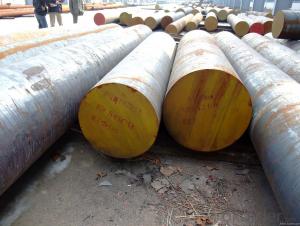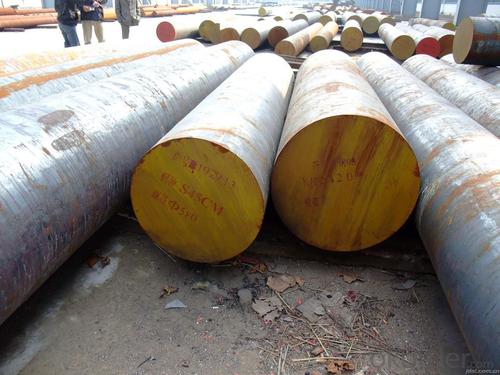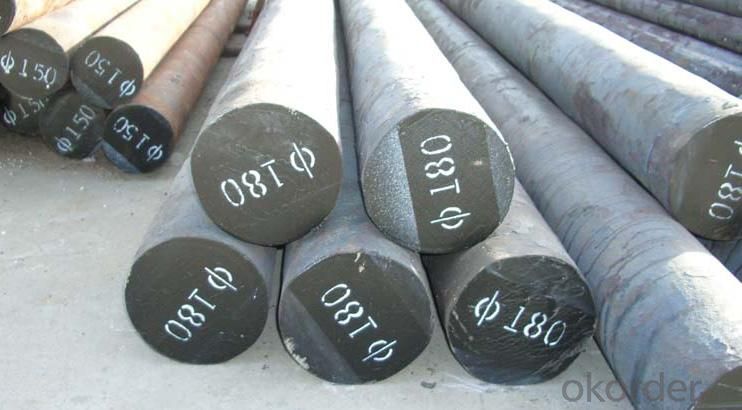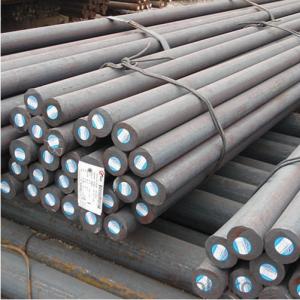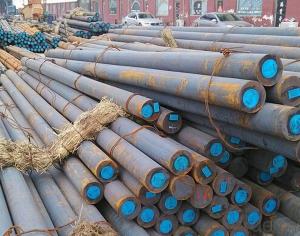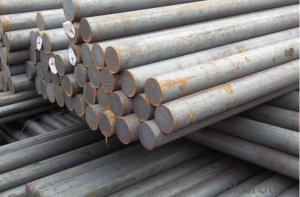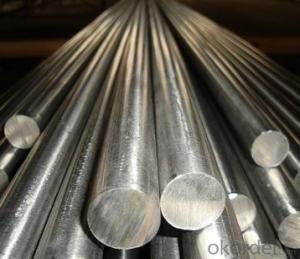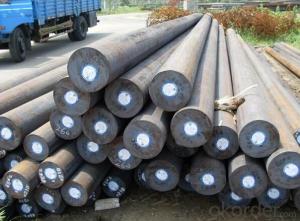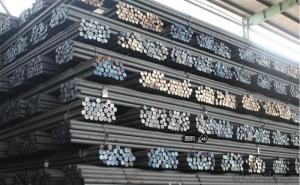Special Steel Forged Steel 709M40 Round Steel Bar
- Loading Port:
- China main port
- Payment Terms:
- TT OR LC
- Min Order Qty:
- 30 m.t.
- Supply Capability:
- 10000 m.t./month
OKorder Service Pledge
OKorder Financial Service
You Might Also Like
Specification
Product Information
1 Chemical Composition:
C | Si | Mn | P | S | Cr | Mo |
0.36-0.44 | 0.10-0.35 | 0.70-1.00 | ≤0.035 | ≤0.04 | 0.90-1.50 | 0.20-0.35 |
2 Brief Introduction:
Dimension | 13-350mm |
Length | 2-13m or as per your request |
Delivery condition | Hot rolled |
Heat Treatment | Normalizing, Annealing, Quenching |
Packing | Standard seaworthy packing or according to your requirements |
3 Mechanical Property:
Yield Strength (MPa) | ≥417.1 |
Tensile Strength (MPa) | ≥655.0 |
Elongation (%) | ≥25.7 |
Hardness (HB) | ≤197 |
Reduction in Area (%) | ≥56.9 |
AKV (J) | ≥54.5 |
Product Show
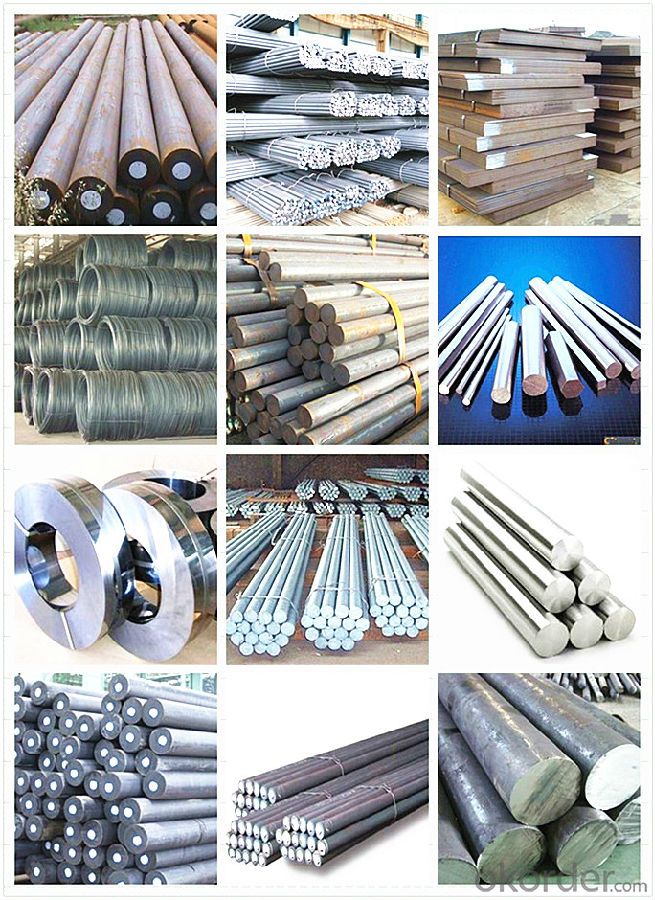
Workshop Show
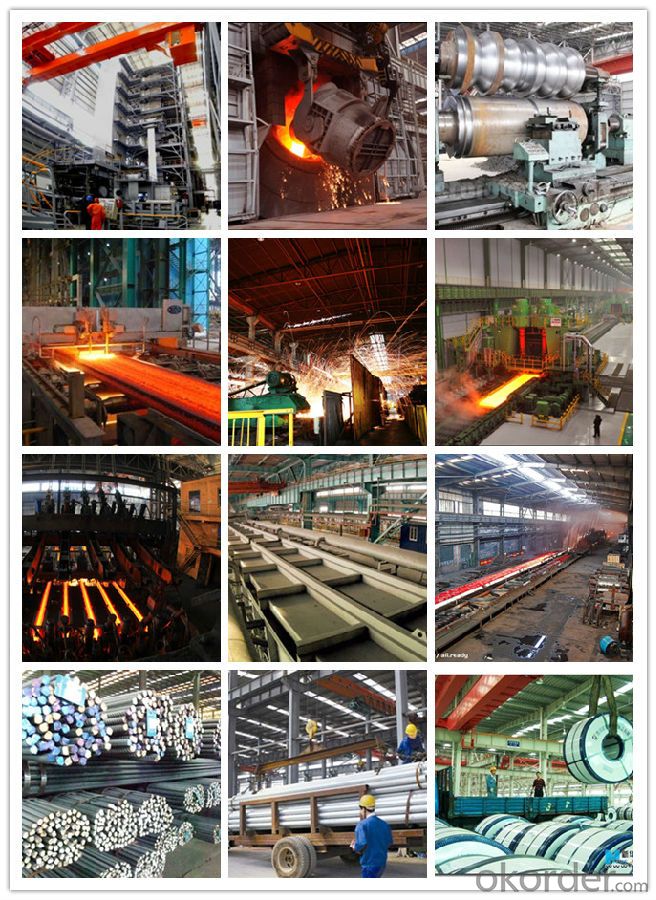
Shipping
1. FedEx/DHL/UPS/TNT for samples, Door-to-Door;
2. By Air or by Sea for batch goods, for FCL; Airport/ Port receiving;
3. Customers specifying freight forwarders or negotiable shipping methods!
Delivery Time: 3-7 days for samples; 5-25 days for batch goods.
Payment Terms
1.Payment: T/T, L/C, Western Union, MoneyGram,PayPal; 30% deposits; 70% balance before delivery.
2.MOQ: 1pcs
3.Warranty : 3 years
4.Package Informations: 1) EXPORT, In 20 feet (GW 25 ton) or 40 feet Container (GW 25 ton)
2)as customer's requirement
Why choose us?
(1) The leading exporter in China special steel industry.
(2) Large stocks for various sizes, fast delivery date.
(3) Good business relationship with China famous factories.
(4) More than 7 years steel exporting experience.
(5) Good after-sales service guarantee.
- Q: How does special steel perform in oil and gas applications?
- Due to its outstanding performance and superior properties, special steel is highly sought after and extensively used in oil and gas applications. The exceptional resistance to corrosion exhibited by special steel is crucial in environments where oil and gas are present, as it helps prevent equipment failure and guarantees the longevity and reliability of the components. In addition, special steel possesses remarkable strength and durability, making it capable of withstanding extreme conditions such as high pressure and temperature. This strength enables the steel to endure the demanding and harsh environments often encountered in oil and gas applications. Moreover, special steel retains its mechanical properties even at elevated temperatures, ensuring stability and reliability in these challenging conditions. Another notable advantage of special steel is its excellent weldability. This property allows for easy fabrication and assembly of components, reducing production time and costs. It also ensures the integrity of the structures and equipment used in oil and gas applications. Furthermore, special steel offers exceptional resistance to fatigue and wear, which are commonly encountered issues in oil and gas operations. The ability of special steel to withstand cyclic loading and abrasive conditions guarantees the longevity and reliability of the components, thereby reducing maintenance and replacement costs. Overall, special steel performs exceptionally well in oil and gas applications due to its corrosion resistance, high strength, durability, weldability, and resistance to fatigue and wear. These superior properties make it the preferred choice for critical components, ensuring the efficiency, safety, and reliability of oil and gas operations.
- Q: How is special steel used in the manufacturing of machinery?
- Special steel is used in the manufacturing of machinery due to its unique properties and characteristics. It provides exceptional strength, durability, and resistance to wear and corrosion, making it suitable for critical components such as gears, shafts, bearings, and cutting tools. Special steel also allows for precise machining and shaping, enabling the production of complex machine parts. Overall, special steel enhances the performance and reliability of machinery, ensuring efficient and long-lasting operation.
- Q: What's the difference between special steel and ordinary steel?
- Special steel is a kind of steel with special chemical composition (alloying), produced by special process, special organization and performance, and can meet special requirement.
- Q: How does the carbon content affect the properties of special steel?
- The properties of special steel are determined by the carbon content, playing a crucial role. Adding carbon to the steel modifies its microstructure and influences various mechanical and physical properties. The main impact of carbon content is on the steel's hardness and strength. Raising the carbon content in special steel leads to an increase in hardness. This occurs because carbon atoms occupy the interstitial sites in the iron lattice, causing a distortion in the crystal structure. Consequently, the steel becomes more resistant to deformation. Additionally, a higher carbon content results in a greater martensitic transformation during heat treatment, further enhancing the material's hardness. Moreover, the strength of special steel is significantly affected by the carbon content. Increased carbon levels lead to greater strength due to the formation of stronger and more abundant carbide precipitates. These carbides act as obstacles to the movement of dislocations, making it more challenging for the steel to deform under load. However, it is important to acknowledge that higher carbon content comes with certain trade-offs. As the carbon content increases, the steel's ductility decreases. This means that the material becomes less capable of deforming without fracturing. High carbon content can make the steel brittle, reducing its toughness and impact resistance. In addition to hardness and strength, carbon content impacts other properties of special steel. It affects the material's wear resistance, as higher carbon content leads to the formation of harder carbides that can withstand wear and abrasion. Carbon also influences the steel's machinability, with higher carbon content making the material more difficult to machine due to increased hardness. In conclusion, the carbon content significantly influences the properties of special steel. It affects hardness, strength, ductility, toughness, wear resistance, and machinability. Therefore, when determining the appropriate carbon content for special steel, careful consideration of desired properties and application requirements is necessary.
- Q: What are the requirements for special steel used in aircraft manufacturing?
- The critical nature of aircraft components and the demanding operating conditions they face necessitate stringent requirements for the special steel used in their manufacturing. Here are several key requirements that must be met: 1. Exceptional strength: To withstand the extreme forces and loads experienced during flight, special steel used in aircraft manufacturing must possess exceptionally high strength. This is crucial for maintaining the structural integrity and safety of the aircraft. 2. Lightweight: While strength is important, the special steel used in aircraft must also be lightweight. This is to minimize the overall weight of the aircraft, which in turn enhances fuel efficiency and allows for increased payload capacity. 3. Excellent corrosion resistance: Aircraft are often exposed to harsh environments, including high humidity, saltwater, and various chemicals. Therefore, the special steel used in their manufacturing must exhibit excellent resistance to corrosion. This helps to maintain the structural integrity of the aircraft and prolong its lifespan. 4. High fatigue resistance: Special steel must possess high fatigue resistance to withstand the repetitive loading and unloading cycles that occur during flight. This ensures that the components do not fail prematurely due to cyclic stress. 5. Heat resistance: The special steel should be able to withstand the high temperatures generated by the engines and the heat generated during high-speed flight. This prevents deformation, melting, or loss of strength under extreme thermal conditions. 6. Good weldability: The special steel used in aircraft manufacturing should have good weldability, which allows for efficient and reliable joining of components during the manufacturing process. This ensures strong and secure connections between various parts of the aircraft. 7. Non-magnetic properties: In certain applications, such as electronic systems, it is essential for the special steel to be non-magnetic. This is to prevent interference with sensitive equipment. 8. Traceability and certification: To meet industry standards and regulatory requirements, the special steel must have proper traceability and certification. This includes documentation of its composition, manufacturing process, and testing procedures to ensure consistent quality and performance. Meeting these requirements is vital to ensure the safety, reliability, and efficiency of aircraft. Before being used in the construction of aircraft components, the special steel undergoes rigorous testing, quality control, and certification processes to ensure it meets these stringent requirements.
- Q: How does special steel contribute to weight reduction in manufacturing?
- Special steel, engineered specifically for various manufacturing applications, possesses certain characteristics that make it suitable. One major advantage of special steel is its ability to reduce weight in manufacturing processes. Industries that prioritize weight reduction, such as automotive, aerospace, and construction, often utilize special steel. This is because special steel has a high strength-to-weight ratio, meaning it can provide the necessary strength and performance while being lighter compared to other materials. Using special steel allows companies to achieve weight reduction in multiple ways. Firstly, the lightweight nature of special steel enables the production of significantly lighter components and structures compared to conventional materials. This reduction in weight offers several benefits, including improved fuel efficiency in automobiles, increased payload capacity in aircraft, and easier handling and installation in construction projects. Moreover, special steel's high strength-to-weight ratio allows manufacturers to design and produce thinner yet equally strong components. This not only reduces overall weight but also optimizes material usage, leading to cost savings and a more sustainable manufacturing process. Additionally, special steel's unique properties, such as excellent formability and weldability, facilitate the creation of complex and intricate designs that further contribute to weight reduction. This versatility enables the production of lightweight components with intricate shapes and structures, enhancing overall performance and functionality. In conclusion, special steel is crucial in reducing weight during manufacturing processes. Its high strength-to-weight ratio, lightweight nature, excellent formability, and weldability enable the production of lighter components and structures. By utilizing special steel, industries can achieve improved efficiency, performance, and sustainability in their manufacturing operations.
- Q: What are the different surface coating techniques for special steel?
- Some of the different surface coating techniques for special steel include electroplating, hot-dip galvanizing, powder coating, thermal spraying, and chemical vapor deposition.
- Q: How does special steel contribute to improving product efficiency in energy-intensive processes?
- Special steel plays a crucial role in enhancing product efficiency in energy-intensive processes by offering superior strength, durability, and heat resistance. It allows for the design and construction of lighter, more compact equipment, reducing energy consumption and improving overall efficiency. Additionally, special steel's corrosion resistance properties help extend the lifespan of machinery, minimizing downtime and maintenance costs. Its use in energy-intensive processes enables better performance, optimized resource utilization, and ultimately contributes to a greener and more sustainable industrial landscape.
- Q: What are the main factors affecting the corrosion fatigue strength of special steel?
- Several factors affect the corrosion fatigue strength of special steel. Firstly, the composition of the steel is crucial. Special steels typically contain various alloying elements like chromium, nickel, molybdenum, and copper, which enhance their corrosion resistance. The presence and quantity of these elements significantly impact the corrosion fatigue strength. Generally, higher levels of alloying elements improve resistance to corrosion fatigue. Secondly, the surface condition of the steel is important. Any surface defects such as scratches, pits, or roughness can act as stress concentrators and accelerate the initiation and propagation of corrosion fatigue cracks. Additionally, the presence of surface contaminants like dirt, grease, or salts can increase the corrosive environment and reduce the corrosion fatigue strength. Thirdly, the environmental conditions in which the steel is exposed play a significant role. Corrosion fatigue occurs due to the combined action of cyclic loading and a corrosive environment. Factors like temperature, humidity, pH, and the presence of corrosive substances such as saltwater or chemicals can accelerate the corrosion process and reduce the fatigue strength. Furthermore, the mechanical properties of the steel, such as hardness, strength, and ductility, also influence its corrosion fatigue strength. Higher strength and hardness enhance resistance to fatigue crack initiation, while greater ductility improves resistance to crack propagation. However, excessive hardness or brittleness can decrease corrosion fatigue strength. Lastly, the design and manufacturing processes of components made from special steel can impact their corrosion fatigue strength. Factors such as welding techniques, heat treatment, and surface finishing can introduce residual stresses or alter the microstructure of the steel, affecting its corrosion fatigue behavior. In conclusion, the corrosion fatigue strength of special steel is influenced by its composition, surface condition, environmental conditions, mechanical properties, and manufacturing processes. Understanding and appropriately addressing these factors are crucial for enhancing the corrosion fatigue resistance of special steel components.
- Q: How is special steel used in the production of springs?
- Special steel is used in the production of springs due to its high strength and durability. The unique properties of special steel allow springs to withstand heavy loads and retain their shape even under extreme conditions. This enables springs to function effectively in various applications such as automotive, aerospace, manufacturing, and more.
Send your message to us
Special Steel Forged Steel 709M40 Round Steel Bar
- Loading Port:
- China main port
- Payment Terms:
- TT OR LC
- Min Order Qty:
- 30 m.t.
- Supply Capability:
- 10000 m.t./month
OKorder Service Pledge
OKorder Financial Service
Similar products
Hot products
Hot Searches
Related keywords
